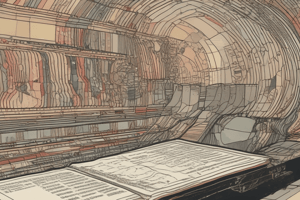Podcast
Questions and Answers
What defines public archives?
What defines public archives?
- Focus solely on institutional records
- Managed by private organizations
- Contain personal papers and correspondence
- Maintained by government entities (correct)
Which of the following is a primary function of archives?
Which of the following is a primary function of archives?
- Creation of digital content
- Promotion of cultural events
- Preservation of records (correct)
- Public education
What type of records do institutional archives focus on?
What type of records do institutional archives focus on?
- Records related to an institution's history (correct)
- Government legal documents (correct)
- General public records
- Personal correspondence (correct)
What challenge related to archives is primarily due to limited financial resources?
What challenge related to archives is primarily due to limited financial resources?
What is the purpose of appraisal in archival methods?
What is the purpose of appraisal in archival methods?
Why are digital archives becoming increasingly popular?
Why are digital archives becoming increasingly popular?
What is a significant ethical consideration in archival work?
What is a significant ethical consideration in archival work?
What is the role of arrangement in archival methods?
What is the role of arrangement in archival methods?
Flashcards are hidden until you start studying
Study Notes
Definition
- Archives are collections of historical documents and records.
- They are preserved for their long-term value and significance.
Types of Archives
-
Public Archives
- Maintained by government entities.
- Contains official records, vital statistics, and legal documents.
-
Private Archives
- Managed by individuals, families, or organizations.
- May include personal papers, correspondence, and organizational records.
-
Institutional Archives
- Associated with specific institutions (universities, corporations).
- Focus on records relating to the institution’s history and operations.
Functions of Archives
-
Preservation of Records
- Safeguard historical documents against deterioration.
-
Access and Research
- Provide access to records for researchers, historians, and the public.
-
Curation
- Organize and categorize documents for easier retrieval.
Importance of Archives
- Serve as primary sources for research and historical documentation.
- Aid in the understanding of societal changes, governance, and culture.
- Protect the legal rights of individuals and organizations.
Archival Methods
-
Appraisal
- Assessing the value of records to determine what should be preserved.
-
Arrangement
- Organizing records in a way that reflects their context and relationship.
-
Description
- Creating finding aids and inventories to help users locate records efficiently.
Digital Archives
- Increasingly popular due to the growth of technology.
- Involves digitizing physical documents for broader accessibility.
- Raises issues of digital preservation and data security.
Challenges
-
Resource Limitations
- Funding and staffing constraints can limit archival work.
-
Technological Change
- Keeping up with evolving technology and formats for preservation.
-
Ethical Considerations
- Navigating issues around privacy, ownership, and access rights.
Best Practices
- Regularly assess and update preservation methods.
- Engage with communities to ensure diverse representation in archives.
- Advocate for funding and policies that support archival work.
Definition of Archives
- Archives consist of historical documents and records preserved for long-term value and significance.
Types of Archives
- Public Archives:
- Maintained by government entities, containing official records, legal documents, and vital statistics.
- Private Archives:
- Managed by individuals, families, or organizations, including personal papers, correspondence, and organizational records.
- Institutional Archives:
- Linked to specific institutions (like universities and corporations), focusing on the institution's history and operational records.
Functions of Archives
- Preservation of Records:
- Protects historical documents from deterioration over time.
- Access and Research:
- Provides researchers, historians, and the public access to essential records.
- Curation:
- Involves organizing and categorizing documents for easier retrieval.
Importance of Archives
- Serve as primary sources for historical research and documentation.
- Aid in understanding societal changes, governance, and cultural evolution.
- Protect the legal rights of individuals and organizations by retaining important records.
Archival Methods
- Appraisal:
- Evaluates the significance of records to determine preservation suitability.
- Arrangement:
- Organizes records based on their context and relationships to one another.
- Description:
- Involves creating finding aids and inventories to facilitate record location for users.
Digital Archives
- Gaining popularity due to advancements in technology.
- Digitizes physical documents to enhance accessibility for a broader audience.
- Raises challenges regarding digital preservation and data security.
Challenges in Archiving
- Resource Limitations:
- Constraints in funding and staffing affect archival work capacity.
- Technological Change:
- Adapting to evolving technologies and formats for effective preservation.
- Ethical Considerations:
- Addressing privacy, ownership, and access rights issues in archival processes.
Best Practices in Archiving
- Conduct regular assessments and updates of preservation methodologies.
- Engage with diverse communities to ensure representation within archives.
- Advocate for policies and funding that support the sustainability of archival work.
Studying That Suits You
Use AI to generate personalized quizzes and flashcards to suit your learning preferences.




